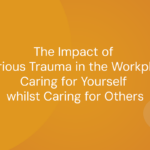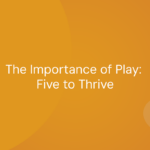
The Impact of Vicarious Trauma in the Workplace: Caring for Yourself whilst Caring for Others.
June 1, 2022
The Importance of Play: Five to Thrive.
September 1, 2022Gill Whalley. August 2022.
At Amber Family, we have been using a restorative approach in our practice since 2017. Prior to this, we probably thought we were a restorative service and on reflection, we were certainly using bits of it. However, we were firing in the dark and using bits of theory, paperwork, and articles we’d read and considered and trying to make the best of it. This initial dabble into the restorative world was, we felt, a good approach to use to address conflict and house issues. Little did we know that there was so much more than simply resolving conflict.
In 2017 we took the plunge and Carol and I went on a 5-day residential course, not knowing what we were going to be letting ourselves in for. We both struggled (and still do?!) at the thought of leaving our service for a whole week and we were apprehensive about how the course would be delivered; were we going to be bored? was this really for us? who else would we be with? And of course, the dread that there would be ROLE PLAY…..!
The course started with circle time. Carol and I shot each other a look; ‘Who signed us up for this?! Help!!!!!!!!’ However, there was no way out and we immersed ourselves in the day. Very quickly things started to fall into place; we stepped out of our comfort zone and listened to what was at the heart of restorative. We did not take any convincing that this was just what Amber’s Family needed and we could see the benefits in many more areas than just managing conflict.
One of the first things we started to notice was the way it improved our communication skills. Restorative taught us the skills of active listening, teasing out more meaningful feedback and information, the benefit of silence and what it feels like to be listened to. Prior to this I thought I was quite good at this, but it turned out that there was definitely room for improvement.
This approach enables us to implement and nurture an ethos that everyone has their own view, thoughts and feelings. It also recognises that thoughts influence emotions, and emotions influence actions. We can acknowledge these without necessarily agreeing with them. Understanding how someone feels and what they’re thinking, supports the development of a good relationship and develops skills in seeing things from another person’s perspective. As a professional, it elevates your communication skills to share your thoughts and feelings eloquently whilst giving consideration to those on the receiving end of your message.
One of my reservations about adopting a restorative approach was that we would lose some authority in our service, and we would be left unable to manage risk or conflict whilst we used a much ‘softer’ strategy. During the course, we talked a lot about how this is used extensively in schools and there was a point when I thought the children would end up running riot as traditional authoritative respect would be lost in exchange for restorative interventions with no consequences. However, the more we learned about the approach, the more reassured I felt.
Restorative encourages everyone to think about the impact their behaviour has on others, rather than exhibiting that poor or ‘bad’ behaviour and then accepting the consequence of their actions or words. Thinking about the impact our behaviour has on others, helps to conclude that we don’t want those impacts to occur, thus encouraging us to change behaviour. This is a much more valuable lesson to learn than that of consequences. An example of this in Amber Family could be that a parent steals from another. Traditionally, the consequence could be a warning or ‘telling off’ and instruction to pay back and apologise. The parent would accept the consequence or try harder to avoid the consequence by not getting caught next time. However, using a restorative approach with the parent, we can look at the ripple effect and impact that stealing has had on the victim, the staff within the setting and the children. We would explore together how it has affected everyone and their thoughts and feelings. Understanding how our actions affect others is essential in creating new skills and changing behaviours. Using a restorative approach is more likely to discourage further stealing. Whilst this is one simple example, adapting the approach is becoming second nature to our staff team.
Despite housing four families in each setting, conflict in the houses is very rare as we adopt a restorative way of dealing with any potential conflict. All of our staff team have had intensive restorative training, and this supports a calm and respectful way to live together in a communal setting.
Part of the restorative model looks at the person and their needs. This is something that we use regularly at Amber as we now acknowledge that talking about needs and acknowledging unmet needs is when we can function at our best. This has been incorporated into our parenting assessment tool, Impact Assessments as we check in with parents and enquire about how they are feeling and what they need.
One of the added benefits of restorative is the way that it develops problem-solving skills. I believe that everyone working in the caring profession has the instinct to help and solve others’ problems. Whilst this intention is good, the downside is that helping doesn’t enable independence and it can impact confidence and self-esteem. At Amber Family, we resist the temptation of giving parents all the answers; instead, we will use subtle restorative enquiries. For example, a parent may ask, ‘Do you think my baby is due a feed?’ Rather than simply give the answer, we would say, ‘What makes you ask that?’ Or ‘What do you think?’ ‘Go on tell me more about why you think that?’ Before you know it, the parent has answered their own question and in time they won’t even need to ask as we’ve enabled them to resolve the issue for themselves.
Whilst a placement at Amber is only a short intervention, we hope that all parents placed with us have an opportunity to develop skills that will continue to benefit them well beyond their assessment. We hope that they develop their communication skills, become more in touch with their needs and feelings, develop confidence, and a clear understanding of how their behaviour and choices affect others, that underneath anger there is an unmet need, and that conflict is not the answer.
I would recommend any school, residential setting or workplace to consider adopting a restorative approach. I know our service will never lose the enthusiasm for creating a restorative service. Since our own training, we have commissioned the full week course for all our staff. Every time we hold this training event, we receive a wealth of positive feedback and continue to recognise the benefits this has on practice and ultimately the families we work with.
